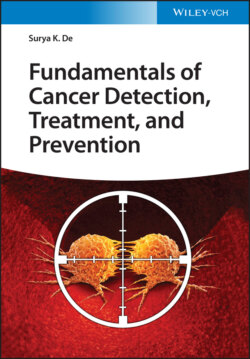Читать книгу Fundamentals of Cancer Detection, Treatment, and Prevention - Surya K. De - Страница 33
1.9 Hereditary Cancer Risk
ОглавлениеIn 5–10% of cancers, the major factor are gene mutations, which have been inherited and predispose an individual to developing the disease. Individuals with these inherited genetic mutations, or hereditary cancer syndrome, are at a significantly greater risk of developing associated cancer. The following conditions suggest a possible increased risk:
Family history of cancer: Having three or more relatives on the same side of the family with the same or related forms of cancer.
Cancer at an early age: Having two or more relatives diagnosed with cancer at an early age. This factor may differ depending on the type of cancer.
Multiple cancers: Having two or more types of cancer occurring in the same relative.
The possibility of heredity cancer is one reason why health screening questionnaires contain questions about cancer (and other illnesses) affecting extended family members.
Genetic Testing. If a person meets any of the criteria indicating they may have a heightened risk for developing cancer, an option they might wish to consider is genetic testing. Choosing to undergo genetic testing is a personal decision made for various reasons, but best made in collaboration with others, including other family members, one's physician, and a genetic counselor.
Currently, consideration of genetic testing is recommended in the following cases:
A personal or family history suggests a genetic cause of cancer.
A test will yield clear results regarding changes in a specific gene or genes.
The results will help with the diagnosis or management of a condition. This might guide someone at higher risk to counteract it with such steps as surgery, medication, frequent screening, or lifestyle changes.
Genetic counselors are very instrumental both in deciding whether or not to undergo genetic testing, as well as conferring with about the test findings. The counselor can explain the pros and cons of genetic testing, help people cope with the process of completing the testing, and give advice regarding ways to lower cancer risk in the future.
